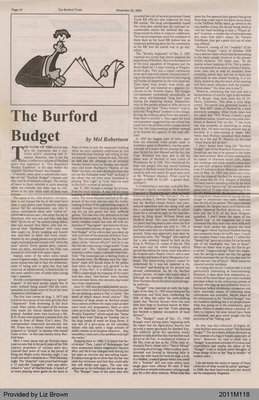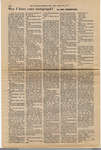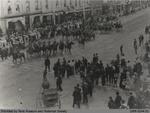The Burford
Budget
by Mel Robertson
I HE NAME OF THIS article may give the impression that it concerns public planning and finances. However, that is not the case. Rather, it refers to a column of Burford news that appeared in "The Brantford Weekly Expositor" in the days before the original "Burford Times" was founded.
I recently came upon a considerable number of old "Burford Budget" columns and they may be of interest to people. The variety of news in these columns is quite amazing when we consider that there was no telephone at the time when most of them were written.
The name of the 1854 Burford correspondent is not known but he or she must have been a very active (and frequently snoopy) person for the correspondent was able to collect information about who "called on" whom on a certain date, who spent the day in Brantford, who was sick and why, who had been "given the air" by certain young ladies, who had painted their fence, who had improved their "backhouse" with vines (and who ought to). Every wedding and funeral was described in detail and every misdemeanor by any young person was given thorough examination and treated with "down the nose" advice. Every garden party, concert, lawn tea party, excursion to the Falls was praised or criticized with equal vigour.
Indeed, some of the news items would cause litigation today. No one was spared and some young men had to face the embarrassment of being told in print that they had received, or administered, "a furious kick" to the most sensitive part of some other young man's anatomy.
Did the correspondent belong to a "gossip" brigade" or did local people supply bits of news without being asked? Did the correspondent ever check some or his or her most slanderous information?
The first item comes on Aug. 3, 1877 and involves the rescue of two little girls by their "chaperone" from drowning in the local creek. Here, surely, the name of the woman who made the rescue should have been printed. Another news item involved a Mr. R.D. Evans who preached a sermon from the stoop in front of Henry Cox's store. The correspondent mentioned sarcastically that Mr. Evans was a former minstrel who was prepared to "preach" to anyone who would listen to him - in this case mostly noisy Bur-ford boys.
Here I must pause and go forward many years to note that in the early years of the 20th century preachers of various sorts proclaimed their point of view at the corner of King and Maple every Saturday night. I can recall one such visitation on a 1920s Saturday night. The "preacher" concerned had brought a 12 year-old "evangelist" who was determined to "save" all Burford kids. A bunch of us were playing some game on the lawn in
front of what is now the municipal building when we were suddenly confronted by this kid proclaiming theology and telling us that we were all "sinners" bound for hell. This fell on deaf ears for, although we all attended Sunday School twice on Sunday and church once and knew Hurlburt's "Stories of the Bible" by heart, we were shocked to hear this kid use the forbidden word "hell" so freely. I am afraid that we were more interested in playing "Red Light" or "Lilo" than we were in this kid's version of salvation.
Jan. 9, 1885 brought a strange bit of news from the local railroad. A man left his horse standing at the station and went in to get his ticket. The horse became alarmed at the approach of the train and ran onto the tracks, running in front of the approaching engine. It crashed through the crossing guards wrecking the rig and guard but only suffered gashes. The man was very alarmed as he had hired the horse and rig. Also at the station a newly wedded couple was sent off with explosions of "fog signals" and showers of rice.
Considerable amount of space in the "Bur-ford Budget" of the above date was taken up with criticism of the election of Police Trustees. The correspondent stated that the chief object of the "elected officers" will be to see that the law concerning village health "is not carried out". The "election" question also inspired a rather cryptic comment from Fair-field: "The municipal pot is boiling lively at the present time. On Monday next the "saw-horse" mark will decide those fit for public food while the balance will go-well to the dogs, if you like". It is difficult in the year 2000 to understand the meaning of this news item but, since "saw-horses" were familiar items on most farms, this sarcastic dig would have been understood.
June 19,1885 also provided another sarcastic news item in which Council was criticized for not draining a pond at Day's Corner, "the smell of which would breed cholers". The existence of large ponds on Burford streets was a serious problem for many years as later news items will demonstrate. Such an item came up in the Oct. 2 issue of the "Brantford Weekly Expositor" which noted that "Some small boys were fishing on Tuesday last in the large ponds of water on King Street. It was sort of a give-away on the township fathers who had spent a large amount of public money to no purpose whatever... Any schoolboy could solve this problem with half the outlay."
Stepping back to 1886, it is noted that hotel-keeper Thos. Lerod of Bishopsgate had been summoned before magistrates Squires Muir and Mclrvine charged with having his bar open on election day and selling liquor. Evidence was given to show that the bar was open but witnesses said that they could only buy soft drinks and cigars. The case was adjourned as the defendant did not show up.
The "Budget" issue of the same date also
recorded the visit of several prominent Grand Trunk RR officials who inspected the local RR station. The local correspondent hoped that these men would note the cold and uncomfortable station but doubted that anything would be done to improve conditions. This was an important cause for complaint in those days as the local RR station was an important gathering place for the community as the RR was the easiest way to go anywhere.
The "Weekly Expositor" of Oct. 2, 1891 reported two events that almost depleted the population of Burford. One was the departure of the local squadron of Dragoons and the Brass Band for 12 days training at Niagara-on-the-Lake. This was a major community event each year with almost everyone marching to the station with the militia and singing sad hymns of departure as the train departed. Then many local people went home, got "gussied up" and departed on a gigantic excursion to the Western States. The Budget correspondent commented sarcastically on the many old-fashioned "plug hats" seen among the departing throng. Meanwhile, with so few people around to offer advice or criticism, the local "Town Fathers" tried to solve the "Frog Pond" problem in the village, driving the stinking pond from one person's front door to another's. Once again the local correspondent suggested that any school boy could solve the problem with a simple shovel but that this long-standing problem seemed to be beyond the capacity of the local officials.
In 1892 the biggest item of news, apart from the afternoon visits people made or weekdays spent in Brantford, was the establishment of a steam-driven planing mill and door factory by Abe Manuel and the fact that Chas. Whitakef had been able to sell his home west of Burford to Sam Carter of Woodstock for $1,200. This resurrected the hope that people who had started building houses in Burford would finish them as they could be sold very easily for good sums such as Mr. Whitaker obtained. (What could be bought in 2000 for $1,200 - a garden shed, perhaps?)
It is interesting to note that, even after Bur-ford had a regular newspaper, the Brantford Expositor's-BurfordBudget" often included items not printed m The Advance . For example, on May 5,1904 the "Budget" reported that the Burford cheese factory had commenced operations and was doing well and that a campaign had been started to collect funds for a recreation park on the land bordered by King Street, William Street and Dufferin Street. This area (which includes my place) had long been a park where the first Burford militia parade was held in 1798. It had been used later as a football and cricket ground. Grass was apparently kept short by pasturing cattle. The "Budget" also reported that a new armoury would be built on the King St. Avilliam St. comer of this lot. This was done and the noble building which served the militia for many years was also a flu hospital and a Baptist church and is now the studio and home of artist Marguerite Larmand. This fund-raising scheme cannot be understood for it was not reported in the "Advance" and building on the ground had already commenced. As for the Burford cheese factory, no more was heard about it although the operation of the Cathcart and New Durham cheese factories received regular publicity.
"Budget" time marched on with the highlight of the May 25,1905 issue being not the explosions and field days celebrating the 24th of May but rather the earth-shaking report that "Several farmers from this area took their hogs to Scotland station on Monday for shipment" and that "Com planting has become a popular occupation of local farmers".
The "Budget" issue of Oct. 11, 1908 brought more stirring news, beginning with the report that the Agricultural Society had secured a merry-go-round for Burford Fair. The publicity given this aquisition would appear to indicated that this was the first such device at the Fair. A mechanical midway at the fair, even as late as the 1920s, only included a Ferris wheel and a "Merry Mixup" revolving set of swings. Other midway entertainment was limited to throwing balls at some nut who stuck his head through a hole in a blanket, crooked games where you could win a "kewpie" doll and tents where local tough guys were offered 50 cents if they could box or wrestle with some visiting tough guy for a few dirty minutes. When kids had
spent the few pennies their parents had given them they could watch the horse races, listen to the Dufferin Rifles band, go down to the race stables to hear the horses break wind or visit the main building to hear a "Player piano" in action - a simple day of entertainment but, since kids didn't expect the Toronto Exhibition, they got a great kick out of what was offered.
However, among all the "twaddle" of the "Burford Budget" report of October 1908 was a special report which may be interesting to the many people involved in the present school situation. The report read, "At the special school meeting of the 23rd a resolution was passed to do away with the Continuation class and to stop all outsiders from attending school here and not to build any additional or new school building. It is not likely, however, that the result of the meeting will have much influence with the trustees' former plans." (So what else is new?)
However, something that was new was a demonstration of electric light in the window of E. Burgis drug store (now site of J.P. Harris Jewellers). This drew a very large crowd. The power was generated locally at the "Red Mill" north of Burford by a local electricity company. Other lively news was the report that "Will Wood, Canada's great marathon runner, would run a two-mile exhibition at Burford Fair on Oct. 7" (an event that was probably as interesting as seeing paint dry). Of more exciting interest was an accident at a barn-raising at Apps' Mill where Sam Wallace sustained three broken ribs by a fall and W. Weaver cut his head "when braces fell on him".
I don't know how long the "Burford Budget" part of the Brantford Expositor continued but one has to be amazed at the items that were printed. Most of them continued to be reports of afternoon social calls, deaths and weddings and snide remarks about people and their property which I cannot print even if I wished to do so. However, one news item of May 18, 1925 may point out a situation that plagued Burford for several years. This states that Dr. P.A. Sargent of Burford had been issued a speeding ticket by the local "Motor Cycle Speed Cop" for exceeding the speed limit of 35 mph when hastening to the
the magistrate rebuked him by saying that the danger to pedestrians was more important than the life of the patient. This was a strange comment. Dr. Sargent was a well known and highly respected Burford physician, a war hero and the C.O. of the local Dragoon squadron. I don't know the name of the "Speed Cop" or the magistrate but it was rumoured that they were very strict with well known local people but ignored the local bootleggers whose big black Hudson touring cars constantly broke all traffic laws. I recall one incident when I was about 17 when this "Speed Cop" gave me a ticket for (as he said) one of my headlights was "not in focus". When my father went to pay the fine he got a severe "tongue-lashing" from this magistrate for daring to point out that the garage which examined the car the next day said the light was not "out of focus". Other motorists reported similar incidents.
In closing this article I realize that it is not particularly interesting or heartwarming. However, it does show how community activities of the most banal type were recorded and pays tribute to the industrious person or persons who dug up and published local information before telephones, computers and other electronic means of collecting local information was available. Maybe some of the information in the "Burford Budget" was not headline-catching but it let people know what was going on in the community, gave public tribute to people whose voluntary efforts to improve the area would have been overlooked, and gave some' insight into the activities of the "rolling year".
So why was this collection of highly diverse Burford area news called "The Burford Budget"? The dictionary defines the word as "the contents of a bag or bundle especially of news". However, we tend to think that a "budget" is an annual estimate of revenue and expenditures and maybe the editor of the "Budget" tried to include some thoughts of these things in his or her "bag or bundle" of weekly news.
I do not know the name or names of these collectors of what would be called "garbage" in 2000, but their hard work and zeal should not be completely forgotten.




